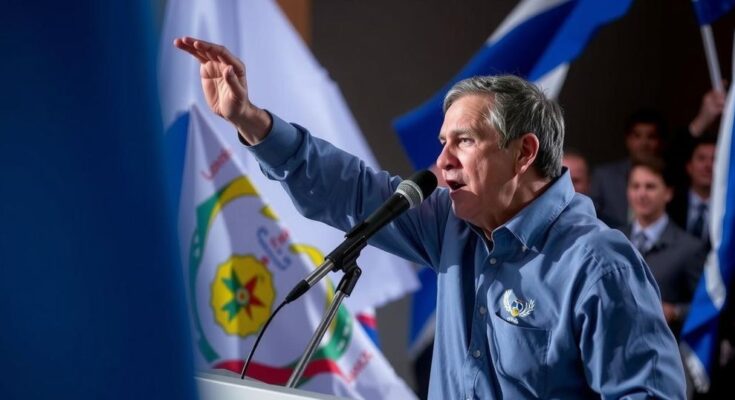Uruguay’s conservative government concedes to left-wing challenger Yamandu Orsi, marking the end of a brief right-leaning administration. Mr. Orsi, from the Broad Front, won with approximately 49% of the vote. His moderate policies aim to address poverty while maintaining core social policies from previous governments, reflecting a global trend of shifting political sentiments.
In a significant political shift, Uruguay’s conservative ruling party has conceded defeat to the left-wing candidate Yamandu Orsi following a closely contested presidential run-off election. Alvaro Delgado, the candidate representing the governing coalition, expressed his regret yet acknowledged the victory of Mr. Orsi, which marks the end of the current government’s brief tenure that began in 2020. As the results were being tallied, Mr. Orsi, from the centre-left Broad Front, emerged as Uruguay’s new leader, following a period of 15 years of governance by the Broad Front preceding the 2019 electoral victory of Luis Lacalle Pou.
Voting turnout reached notable levels, with 89.4%, consistent with previous rounds, reflecting the compulsory nature of elections in Uruguay. With preliminary counts indicating Mr. Orsi garnered approximately 49% of the votes, compared to Mr. Delgado’s 46%, this win represents a broader trend of voters globally disillusioned with incumbent administrations in this pivotal election year. However, unlike many global counterparts, Mr. Orsi, known for his pragmatic approach, does not intend to implement extreme policy changes, maintaining a focus on crucial issues such as poverty alleviation and organized crime.
He promises a balanced approach akin to the economic policies championed by his predecessors in the Broad Front, emphasizing tax incentives for investments and social security reforms. This moderate stance suggests a continuity in governance with the overarching goal of improving living conditions for Uruguayans. The electoral defeat reflects a growing discontent with current governments amid economic strife following the pandemic, indicating a shift toward progressive governance.
Uruguay has transitioned from a left-wing to a right-wing government in recent years, culminating in the election of Luis Lacalle Pou in 2019. The Broad Front, which held power for 15 years prior, is credited with significant social reforms, such as the legalization of abortion and same-sex marriage. The recent election underscores a growing sentiment among voters weary of economic challenges exacerbated by the pandemic, mirroring a global trend of political upheaval as citizens seek alternative leadership focused on stability and improvements in social welfare.
The presidential run-off results signal a pivotal shift in Uruguay’s political landscape, with Yamandu Orsi’s victory reestablishing the Broad Front’s governance after a brief conservative interlude. His moderate agenda, aimed at fostering economic growth and reducing poverty, aligns with the previous governing strategies that have garnered international recognition. As Uruguay navigates economic recovery post-pandemic, Mr. Orsi’s leadership could mark a significant step toward fulfilling the aspirations of its citizens for improved welfare and social conditions.
Original Source: www.expressandstar.com




